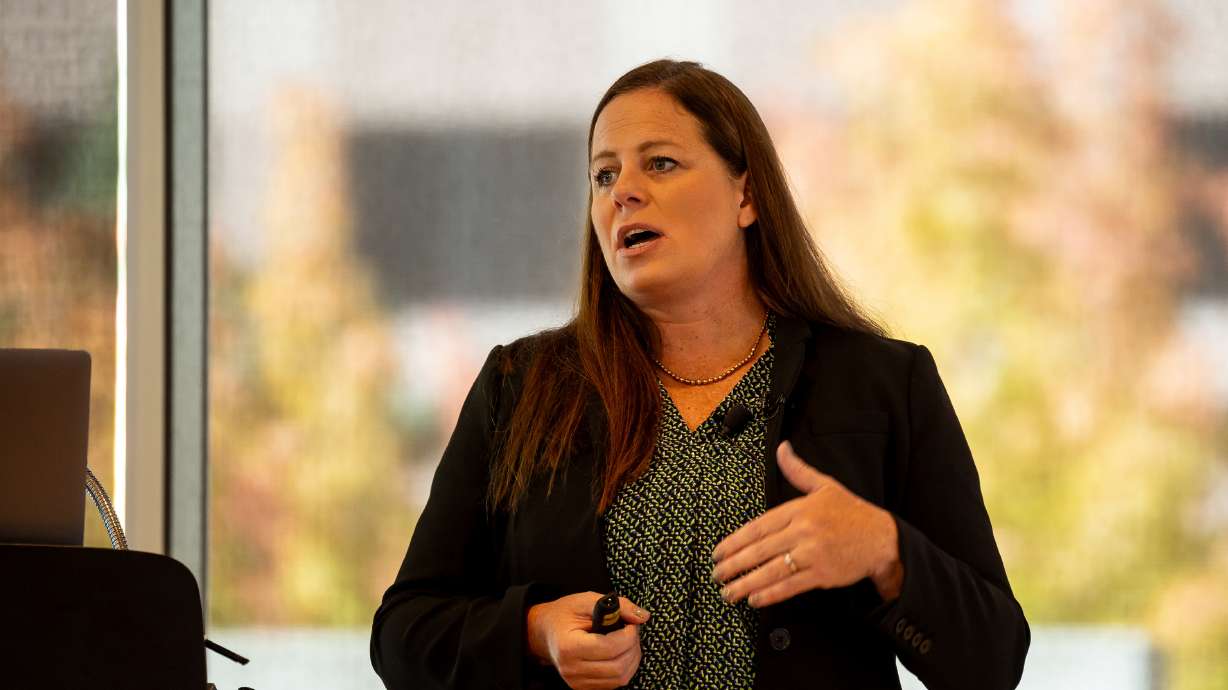Estimated read time: 4-5 minutes
This archived news story is available only for your personal, non-commercial use. Information in the story may be outdated or superseded by additional information. Reading or replaying the story in its archived form does not constitute a republication of the story.
SALT LAKE CITY — The number of Utahns with dementia is expected to grow by 23.5% between 2020 and 2025 — to 42,000 people.
"We have to start paying attention, we have to start doing something about this," Elizabeth Fauth said at a research event on Thursday.
Utah State University hosted the event at the Gallivan Center on Thursday to discuss research into dementia to prepare the state for this significant increase.
Fauth, a human development and family studies professor at Utah State University, said Utah has people who live longer, so they are more at risk for age-related diseases; the state also has many retirees, leading to a larger elderly population and more people with dementia.
She said statistically Alzheimer's, which accounts for about 60% of those with dementia, will impact everyone — whether they, a relative, or another loved one is diagnosed. That is why there is currently momentum behind research into dementia and Alzheimer's.
"It's impacting people right now, and it's going to continue to do so," Fauth said.
Utah's government leaders have a 2023 dementia plan with goals to build awareness, create a dementia-competent workforce, create a better quality of life for people with dementia, empower caregivers and expand research.
USU President Elizabeth Cantwell said the university recently celebrated the one-year anniversary of its Alzheimer's Disease and Dementia Research Center, which has distributed $375,000 to support ongoing research — and there is a lot more to do.
"You can't be in the research world anywhere and not know the heaviness of the social burden of dementia anywhere in the world, but certainly in the U.S.," she said.

Cantwell said USU administrators encourage faculty members to work across disciplines, and that is reflected in their work to address dementia.
The school has about 15 faculty members who are affiliated with the Alzheimer's Disease and Dementia Research Center, and there are many students who are actively completing and presenting research. Fauth, who directs the research center, said the Utah Legislature gave $850,000 in ongoing funds to help establish the center and that they hope to work with community partners, engage students and expand their grants to other universities to collaborate on research.
Fauth said she began her interest in dementia when, as a 15-year-old, she found a job caring for elderly people. For many years she has done research into how to help caregivers of people with dementia.
She said although memory loss is the most prevalent symptom, there are multiple other symptoms that can make it harder for caregivers, like wandering, depression or aggression. She said most family members want to provide care, but when people show resistance it can be harder to continue — especially since caregivers may need to provide care for between five and 20 years.
"Families are doing the vast majority of the work, and it's intense and somewhat challenging work even if they want to be there," Fauth said.
She also said most caregivers are on their own; only 53% said that they received any unpaid help, and many are providing care almost all or all of the time.

Fauth was involved in a USU study that found if caregivers met with a counselor on their own, and then with their entire family for four sessions, and then on their own again, the process decreased family conflict and increased the amount of support felt by the caregivers.
USU has built on this study and created an online program that also helps improve caregivers' experiences. They are able to access the help remotely whenever they have time, through USU Extension in an online self-guided program, which makes it available to even more caregivers. Fauth said it was a small study that is currently being expanded, but the initial research shows that the course improved caregivers' lives for months after they completed it.
She also shared studies completed by others at the center. USU psychology professor JoAnn Tschanz has researched differences between people who have a rapid decline and people who decline more slowly, and she is planning to expand that study to more diverse populations. Naveen Nagaraj, associate professor of audiology at USU, has studied whether it's possible to reverse or slow down changes in brain activity that occur when hearing loss is left untreated.
Fauth said the university is approaching the problem from many sides, so that hopefully the Alzheimer's Disease and Dementia Research Center can impact caregivers and dementia patients in multiple ways.
She said they are not doing the research for the funding, or because it's the next big thing to study, but for the many people who are impacted by dementia.










